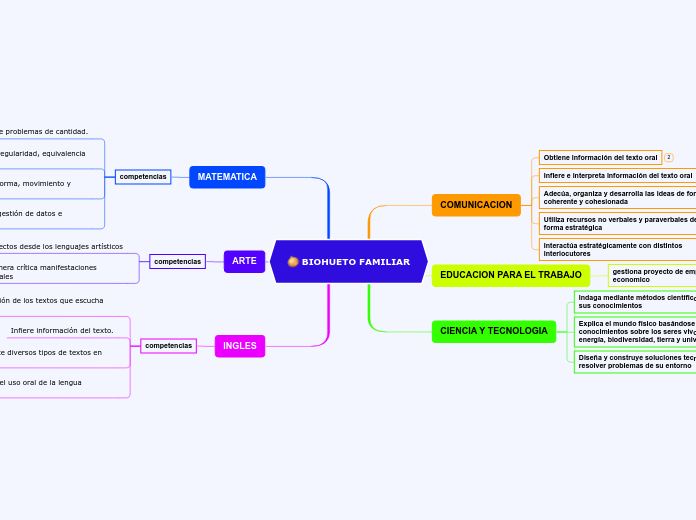BIOHUETO FAMILIAR
The part of speech is a category to which a word is assigned according to its syntactic functions. In English the main parts of speech are noun, pronoun, adjective, determiner, verb, adverb, preposition, conjunction, and interjection.
INGLES
A conjunction is a word like 'if' 'but' or 'and' which is used to connect sentences or clauses together.
Coordinating conjunctions always connect phrases, words, and clauses. They are: for, and, nor, but, or, yet, so.
Reflexiona sobre el uso oral de la lengua extranjera
Expresa oralmente diversos tipos de textos en inglés
Infiere información del texto.
Obtiene información de los textos que escucha en inglés.
ARTE
A preposition is one of the most exciting parts of grammar. A preposition is used to describe the location of something in relation to something else.
Compound preposition consists of two or more words.
Aprecia de manera crítica manifestaciones artístico-culturales
Crea proyectos desde los lenguajes artísticos
MATEMATICA
A numeral is a word or phrase that describes a numerical quantity.
Some theories of grammar use the word 'numeral' to refer to cardinal numbers that act as a determiner to specify the quantity of a noun, for example the 'two' in 'two hats'.
competencias
Resuelve problemas de gestión de datos e incertidumbre
Resuelve problemas de forma, movimiento y localización
Resuelve problemas de regularidad, equivalencia y cambio
Resuelve problemas de cantidad.
CIENCIA Y TECNOLOGIA
A pronoun is a word that can be used in place of a noun, typically after the noun itself has already been stated.
Diseña y construye soluciones tecnológicas para resolver problemas de su entorno
Unlike demonstrative pronouns, which point out specific items, indefinite pronouns are used for non-specific things. This is the largest group of pronouns. All, some, any, several, anyone, nobody, each, both, few, either, none, one, and no one are the most common.
None, Several
Explica el mundo físico basándose en conocimientos sobre los seres vivos, materia y energía, biodiversidad, tierra y universo
Relative pronouns are used to add more information to a sentence. Which, that, who (including whom and whose), and where are all relative pronouns.
Which, Where
Indaga mediante métodos científicos para construir sus conocimientos
A reflexive pronoun ends with ...self or ...selves and refers to another noun or pronoun in the sentence (usually the subject of the sentence). The reflexive pronouns are myself, yourself, herself, himself, itself, ourselves, yourselves, and themselves.
Itself, Himself
EDUCACION PARA EL TRABAJO
A noun is defined as a person, place, thing or idea. Proper nouns always begin with a capital letter. Common nouns, which are general words, such as 'cars,' are not capitalized.
gestiona proyecto de emprendimiento social y economico
Proper nouns are the names of specific people or places. They should always begin with a capital letter.
Mary, Paris
COMUNICACION
A verb is an action word or 'doing' word that signifies movement in some way.
Interactúa estratégicamente con distintos interlocutores
An auxiliary verb helps the main (full) verb and is also called a 'helping verb.' With auxiliary verbs, you can write sentences in different tenses, moods, or voices.
You have been practicing hard.
Utiliza recursos no verbales y paraverbales de forma estratégica
A participle is a verb form that can be used as an adjective or to create a verb tense. There are two types of participles: Present participle (ending -ing) and Past participle (usually ending -ed, -d, -t, -en, or -n).
The winning athlete gets a trophy.
Adecúa, organiza y desarrolla las ideas de forma coherente y cohesionada
A modal is a type of auxiliary (helping) verb that is used to express: ability, possibility, permission or obligation. The main modal verbs in the English language are: can, could, may, might, must, shall, should, will, would.
I might go to the park if I get my homework done.
Infiere e interpreta información del texto oral
A linking verb connects the subject with a word that gives information about the subject, such as a condition or relationship.
You look exhausted after studying all night.
Obtiene información del texto oral
A verb with its own meaning: a verb that is not an auxiliary verb.
Create sentences
They have it.









